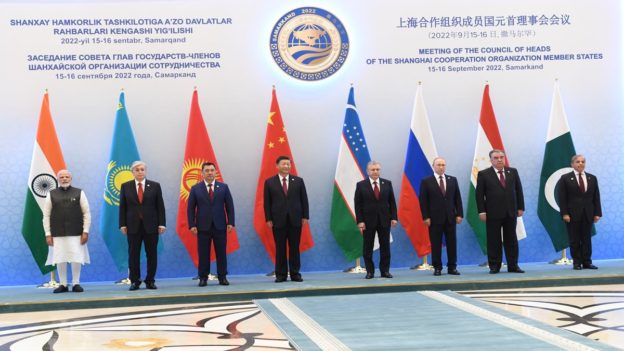Uzbekistan wants India to play a bigger role in SCO. Uzbekistan is one of the key countries of the region of Central Asia. It is interested in bringing all big partners in a broader partnership in this region. In this regard, India is one of the key members of this organisation which has great political and diplomatic possibilities as well as the economic and trade potential.
All eyes are on India as Prime Minister Narendra Modi touched down in Samarkand for nearly 24 hours of intense high-wire diplomacy. Being an emerging power and the world’s fifth largest economy, there are high expectations from India as Uzbekistan and many key countries in the region want India to play a bigger role in the eight-nation Shanghai Cooperation Organisation. Manish Chand, of Centre for Global India Insights (CGII), a global think tank focused on global affairs, caught up with Uzbekistan National Coordinator H.E. Rakhmatullah Nurimbetov on the sidelines of the SCO summit in Samarkand.
The region and the world is closely watching the SCO summit in Samarkand. What will be major takeaways from the SCO summit?
We are living in a very challenging world – in a world which is becoming more connected. The SCO summit in Samarkand is very important for many reasons. This is the first time the leaders of SCO countries are meeting in-person for the first time after the coronavirus pandemic. This time around, the leaders will meet for the first time not only in the format of member states or observer states, but in a broader format, because Uzbekistan has invited additional four leaders of four countries, including Turkey, Azerbaijan, Armenia and Turkmenistan. The presence of so many leaders makes this SCO summit historic.
The Samarkand summit will result in key decisions for expansion of the SCO grouping. Iran will sign the Memorandum of Obligations with the SCO to become a permanent member; six more new countries will acquire the status of dialogue partner of the SCO. Four of them are Arabic countries – Saudi Arabia, Qatar, Egypt, and the United Arab Emirates. The leaders will take the decision to begin the process of full membership of Belarus. It doesn’t mean that Belarus will become a full member this year. But hopefully, next year Belarus will become full member of SCO during Indian chairmanship. The SCO summit in Samarkand will set the stage for a new phase of all-round cooperation in SCO.
What are the major focus areas of Uzbekistan in its SCO presidency?
Under its presidency, Uzbekistan has tried to broaden and expand the agenda of the SCO by focusing not only on security issues, but also on trade, investments and innovation. Enhancing connectivity and promoting regional economic integration will figure prominently in the SCO agenda. One can expect important outcomes in this area.
India takes over the presidency of SCO next year. What are the expectations of the SCO and the region from India? What kind of role the SCO would like India to play in the region?
India will take over the presidency of this organization from Uzbekistan time in September this year, and it will do so in very challenging circumstances. We expect a lot from India. India has a huge potential. India is a huge Asian country, which has its own position on global issues. India’s role in the security field is growing. India also has a big role to play in regional geopolitics and connectivity.
Uzbekistan wants India to play a bigger role in SCO. Uzbekistan is one of the key countries of the region of Central Asia. It is interested in bringing all big partners in a broader partnership in this region. In this regard, India is one of the key members of this organisation which has great political and diplomatic possibilities as well as the economic and trade potential.
Uzbekistan wants India to come closer to Central Asia. Our position is welcomed very well by the Indian side. During the last ministerial meeting of the SCO countries in July, India’s External Affairs Minister S. Jaishankar said that Central Asia should be central to the SCO. This is a very powerful message towards the region and towards the SCO.
What role can the SCO play in calling Taliban-ruled Afghanistan to account?
A Taliban delegation will not be present at the SCO summit in Samarkand due to the events of last year. While individual SCO members may have direct dealings with the Taliban regime in Kabul, the SCO as a multilateral organisation does not recognise Taliban-ruled Afghanistan. The focus will be on shaping a broad-based inclusive government in Afghanistan which includes women and minorities. This is the consensus of the region and the international community.
https://www.financialexpress.com/defence/india-has-a-big-role-to-play-in-sco-uzbekistans-sco-coordinator/2668929/?utm_source=newzmate&utm_medium=email&utm_campaign=femain&pnespid=CLEk9V5D9CAPlESEs86LEElOvw86y_hvpxxPEaBSPs3Ko4pCVrHj._ySKfUF3BFUZOj7Wkb0





